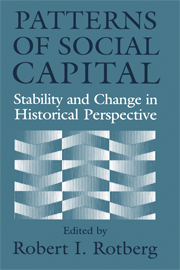Book contents
- Frontmatter
- Contents
- Introduction Social Capital and Political Culture in Africa, America, Australasia, and Europe
- Articles
- Civic Traditions in Premodern Italy
- The Sources of Civil Society in Italy
- Finding Social Capital: The French Revolution in Italy
- Social Capital in the Early Industrial Revolution
- The Diversity of Social Capital in English Communities, 1300–1640 (with a Glance at Modern Nigeria)
- Social and Cultural Capital in Colonial British America: A Case Study
- The Growth of Voluntary Associations in America, 1840–1940
- Civil Society as Democratic Practice: North American Cities during the Nineteenth Century
- Securing Political Returns to Social Capital: Women's Associations in the United States, 1880s–1920s
- Second-Generation Civic America: Education, Citizenship, and the Children of Immigrants
- Human Capital and Social Capital: The Rise of Secondary Schooling in America, 1910–1940
- From Local to National Political Cultures: Social Capital and Civic Organization in the Great Plains
Civil Society as Democratic Practice: North American Cities during the Nineteenth Century
Published online by Cambridge University Press: 12 April 2010
- Frontmatter
- Contents
- Introduction Social Capital and Political Culture in Africa, America, Australasia, and Europe
- Articles
- Civic Traditions in Premodern Italy
- The Sources of Civil Society in Italy
- Finding Social Capital: The French Revolution in Italy
- Social Capital in the Early Industrial Revolution
- The Diversity of Social Capital in English Communities, 1300–1640 (with a Glance at Modern Nigeria)
- Social and Cultural Capital in Colonial British America: A Case Study
- The Growth of Voluntary Associations in America, 1840–1940
- Civil Society as Democratic Practice: North American Cities during the Nineteenth Century
- Securing Political Returns to Social Capital: Women's Associations in the United States, 1880s–1920s
- Second-Generation Civic America: Education, Citizenship, and the Children of Immigrants
- Human Capital and Social Capital: The Rise of Secondary Schooling in America, 1910–1940
- From Local to National Political Cultures: Social Capital and Civic Organization in the Great Plains
Summary
On the threshold of the twenty-first century, many scholars and citizens are grasping for some sense of societal purpose more substantial and satisfying than the aggregated narcissism that triumphed in the last. Yet, the various formulations of the object of this quest, “Social capital,” “civic engagement,” “the public sphere,” or “civil society,” strike contradictory chords of meaning. “Social capital” might ring pleasantly in the ears of social scientists, but to some humanists, it emits a discordant economistic sound. “Civic engagement” might recall the pieties of a citizenship class convened a half century ago, which alternately comfort and repel. Gold-plated philosophical terms like “civil society” and “the public sphere” come enmeshed in a thicket of theoretical writing, much of it bound to parochial Western political theory. While the range and variety of issues that this special issue of the journal calls forth is to be applauded, such heterogeneous expectations can also lead to confusion and miscommunication. Thus, at the outset, let me state my own particular interpretation of what is at stake in the contemporary discussions of social capital.
The concept of social capital is a strategic vantage point from which to mount a discussion of a number of critical and interrelated concerns that have made their way into dispersed personal libraries and private offices for at least the last decade: first, the discovery of an extensive network of women's organizations that undergirded American political history (especially the development of the welfare state); second, a theoretical search for the “public” that is invigorated by an extensive list of authors, ranging from Alexis de Tocqueville to Jürgen Habermas; and finally, that noisy, sometimes surly face-off between multiculturalism and its critics.
- Type
- Chapter
- Information
- Patterns of Social CapitalStability and Change in Historical Perspective, pp. 221 - 246Publisher: Cambridge University PressPrint publication year: 2000



